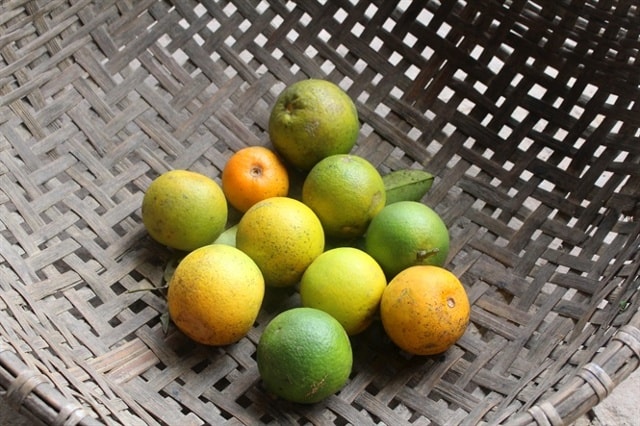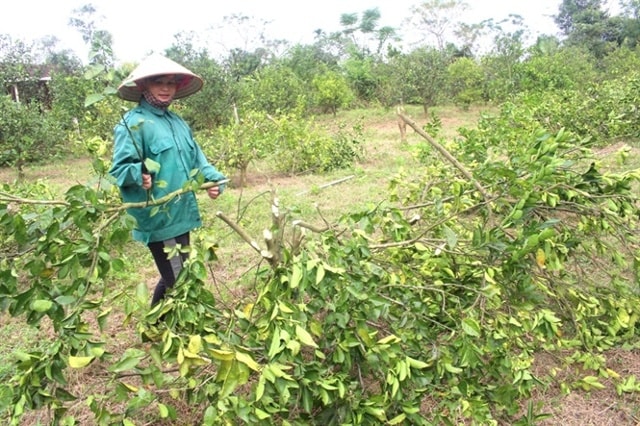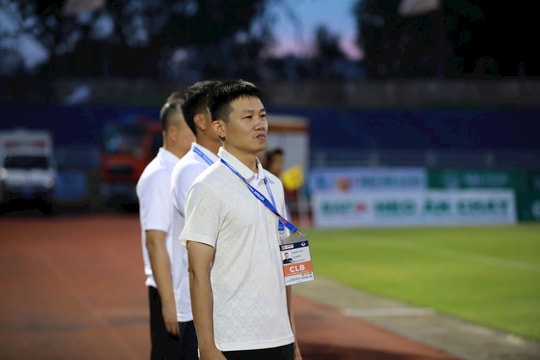Nearly 1,000 orange trees had to be cut down because of poor quality.
Nearly 1,000 orange trees have signs of yellow leaves, sour and rough fruit, so now we have to cut them all down. It's so sad, all the effort we have put into fertilizing for more than 5 years has not yielded any harvest, now it's all gone down the drain.
 |
| The oranges are small and sold for cheap. Photo: Agriculture |
Due to purchasing orange varieties of unknown origin, many households in Huong Thuy commune (Huong Khe district, Ha Tinh) have suffered crop losses. Traders do not come to buy or buy at very low prices, many households accept to cut down all the "wild" orange varieties after years of effort and money spent on care.
Mr. Thieu Sy Hung’s family (village 4) has been growing oranges for decades with more than 1,000 trees, but he has never had to cut down an orange tree that was planted just 5 years ago. Yet this year, he has destroyed more than 200 trees to plant a new variety of orange.
According to Mr. Hung, in 2012, he bought 400 seedlings from the couple Tai - Hong (Phuc Trach commune) for 20,000 VND/tree to plant. After a period of care, by 2015, all of these orange trees began to bear fruit. Currently, the orange trees produce very few fruits and the fruits are of poor quality, so they are very difficult to sell.
Sitting absentmindedly next to the orange tree, Mr. Hung said: “When we bought the “young” tree, it was very normal and grew well. The first year it produced large, pretty fruit, but the skin was a bit thick, so it could not be sold for a good price. Thinking that it was partly due to not taking care of it properly, my husband and I discussed keeping it and taking care of it in the hope of improving the quality of the fruit. In the second season, despite the good care, the fruit gradually became smaller, more sour, and had a thicker skin.
Up to now, the orange tree is very tall, the fruit is very small and has only the pulp but no leaves. Because the fruit is of poor quality, it is very difficult to sell the oranges. Traders buy them for 2,000 - 10,000 VND/kg, but we have to beg them to agree to buy, while the same type of orange in the garden but good variety is priced from 30,000 - 35,000 VND/kg. In a few days, I will hire a machine to dig up the entire orange tree to replace it with a new variety, because the longer I leave it, the more I will lose the crop.
More tragically, Mr. Tran Dinh Dung's family (village 4) was one of the households that suffered the most damage when they had to destroy nearly 1,000 orange trees. In 2012, his family bought 400 orange seedlings from Mr. Phan Van Son (Phuc Dong commune) and nearly 600 seedlings from Viet nursery (Huong Long commune) for 20,000 VND/tree. After many years of care, all of these trees have grown and flourished but do not bear fruit or have thick, rough skin and a sour taste.
Not only Hung and Dung’s families, but also dozens of households in Huong Thuy commune are in the same situation, with a few hundred trees, and a large number up to thousands. Many families had to sadly hire machines to destroy the trees to plant new varieties of oranges or grapefruits.
Discussing this issue, Mr. Bach Dinh Huu, Chairman of the Farmers' Association of Huong Thuy commune, said: "Immediately after receiving feedback from the people, we went down to the site to check the situation.
According to initial statistics, the whole commune has about 10 hectares with more than 5,000 orange trees that produce poor quality fruit, the trees do not grow, most concentrated in villages 1, 2, 4 and 7, causing many families to lose their crops even though this year's orange crop is considered quite good. The cause of this situation has not yet been determined, however, it may be due to the impact of floods, pests, or it may also be due to unsuitable soil quality, poor quality seed sources...
 |
| Many people in Huong Khe had to cut down their orange trees. Photo: Agriculture |
Mr. Le Quang Vinh, Head of the Agriculture Department of Huong Khe district, said: “The Department has learned about the above incident and directed the commune to go to each household to check the specific number of poor quality orange trees in the area. Because these orange trees were planted 4 years ago, we have to go to each household to verify the incident. It is necessary to check who the people bought the seeds from, and whether there were any documents or contracts confirming the process of getting the seeds. The district also requested the locality to report to the Agriculture Department soon so that we can coordinate with the inspection team to handle the matter.”
According to Agriculture








